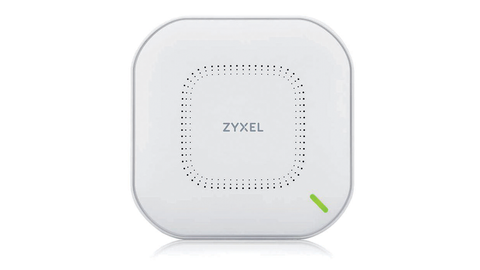IT Pro Verdict
Pros
- +
Simply setup
- +
Plenty of smart features
Cons
- -
Expensive
Zyxel is upping its game in the business Wi-Fi 6 market, with its Ultimate range of access points (APs) offering a fine blend of features and performance. The WAX630S teams up a speedy dual-band AX3000 rating with support for high-speed Wi-Fi 6 160MHz channels and a choice of management modes.
It exhibits the same sturdy build quality as Zyxel's speedy WAX610D and also provides integral 4G/5G interference filters plus power surge protection. Speeds and feeds are the same for both APs; the main difference between them is their internal antenna circuit boards.
The WAX610D uses a dual-optimised antenna array that must be manually set for ceiling or wall mount placements. The WAX630S's board presents a smart array that will work in either position and dynamically adjusts its aerial patterns to boost performance.
The WAX630S costs only a little more, and we tested them to see which is best. We connected them to a Zyxel XS1930-12HP 10GbE multi-gigabit PoE++ switch, used a Dell T640 Windows server with a 10GbE connection to the switch and called up our Dell Windows 10 Home workstation equipped with a TP-Link Archer TX3000E Wi-Fi 6 PCI-E adapter.
With each AP set to use their 80MHz channels there was nothing between them, with close range copies of a 25GB test file between the workstation and server both averaging 107MB/sec. With the APs moved ten metres away and into an adjoining room, each delivered the same average speed of 94MB/sec. Enabling the 160MHz channels saw the WAX630S move slightly ahead, with close range speeds of 188MB/sec as opposed to 180MB/sec for the WAX610D. At ten metres, the WAX630S averaged 163MB/sec – a small 4MB/sec increase over the WAX610D.
You have three management choices. The WAX630S can run in standalone mode or be remotely managed using Zyxel's on-premises NXC controller appliances. However, most businesses will prefer Zyxel's Nebula Control Center (NCC) cloud management, which opens up a wealth of features, and the price includes a one-year Professional Pack licence that enables email alerting, scheduled firmware updates and a one-year log retention service.
Adding the WAX630S to our cloud account was easy. We logged into the Nebula app on an iPad, selected our predefined site and scanned in the QR code on the AP's base. The app picked up its MAC address and model name and added it to the active site with a single tap. Each site supports up to eight SSIDs, each with their own authentication scheme (including WPA3). You can enable custom captive portals, L2 isolation, walled gardens and upload and download rate limits. Every site SSID can be broadcast by all cloud-managed APs or you can assign custom tags to each one and associate specific SSIDs with them.
Cloud management brings Zyxel's smart mesh feature into play. One AP with a direct connection to your gateway is designated as a root device, with repeater APs wirelessly connecting to it for an easy increase in network coverage.
Small businesses that don't want the extra expense of a firewall wil find Zyxel's optional Connect and Protect+ (CNP+) service worth considering. Costing around £22 per AP per year, a CNP+ licence enables application visibility and threat protection using DNS and IP reputation filters to block users from browsing unsafe sites.
After enabling CNP+ on our WAX630S, the NCC site dashboard presented two new graphs showing the top applications being used and hits on the threat protection service broken down into web attacks, botnets, scanners, spam sites and malicious URLs.
The WAX630S isn't the cheapest Wi-Fi 6 AP on the market but it delivers a lot of smart features for the price. Performance is impeccable, it can be easily cloud-managed and the affordable CNP+ threat prevention service could save small businesses the cost of a firewall.
Dave is an IT consultant and freelance journalist specialising in hands-on reviews of computer networking products covering all market sectors from small businesses to enterprises. Founder of Binary Testing Ltd – the UK’s premier independent network testing laboratory - Dave has over 45 years of experience in the IT industry.
Dave has produced many thousands of in-depth business networking product reviews from his lab which have been reproduced globally. Writing for ITPro and its sister title, PC Pro, he covers all areas of business IT infrastructure, including servers, storage, network security, data protection, cloud, infrastructure and services.


